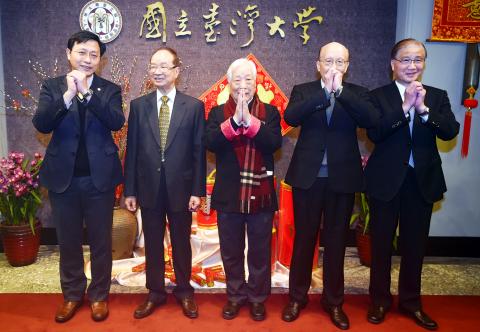Three former National Taiwan University (NTU) presidents yesterday criticized the government for not approving the appointment of NTU president-elect Kuan Chung-ming (管中閔) and undermining university autonomy.
It has been almost 50 days since the ministry received documents about Kuan’s election and the delayed appointment has caused great anxiety among faculty, students and alumni alike, former university president Sun Chen (孫震) said at a Lunar New Year event hosted by the university.
Kuan was originally scheduled to take office on Feb. 1, but the Ministry of Education put his appointment on hold due to allegations of plagiarism and a conflict of interest that cast doubt over his eligibility.

Photo: Liao Chen-huei, Taipei Times
Sun blamed President Tsai Ing-wen (蔡英文) — an NTU alumnus — for Kuan’s delayed appointment and said that every major policy her administration has promoted “has been damaging to the nation.”
“Is her next step aimed at causing damage to her own school? Or Taiwan’s academia, including all 21 members on the NTU presidential selection committee?” Sun asked.
The Tsai administration has already lost credibility because of its poor policies and it is now risking losing more trust and respect from the public by not approving Kuan’s appointment, he said.
Former university president Chen Wei-jao (陳維昭), who doubles as convener of the school’s presidential selection committee, said the ministry was disregarding regulations and disrespecting university autonomy.
“This is the darkest time for university democracy and academic freedom,” he said. “We must work together to safeguard academic freedom and eventually the school shall triumph.”
The university should preserve documents related to the election to preserve this moment in its history, he added.
Former university president Lee Si-chen (李嗣涔) called on Tsai to stop the education ministry from interfering with university autonomy and abusing its power.
“The ministry has tortured NTU for more than a month,” he said, adding that university autonomy was “on the verge on dying.”
Former university president Yang Pan-chyr (楊泮池), who stepped down in June last year after he became embroiled in an academic fraud scandal, did not explicitly comment on the election, but said that he hoped the university could soon “leave all its troubles behind.”

Alain Robert, known as the "French Spider-Man," praised Alex Honnold as exceptionally well-prepared after the US climber completed a free solo ascent of Taipei 101 yesterday. Robert said Honnold's ascent of the 508m-tall skyscraper in just more than one-and-a-half hours without using safety ropes or equipment was a remarkable achievement. "This is my life," he said in an interview conducted in French, adding that he liked the feeling of being "on the edge of danger." The 63-year-old Frenchman climbed Taipei 101 using ropes in December 2004, taking about four hours to reach the top. On a one-to-10 scale of difficulty, Robert said Taipei 101

Taiwanese and US defense groups are collaborating to introduce deployable, semi-autonomous manufacturing systems for drones and components in a boost to the nation’s supply chain resilience. Taiwan’s G-Tech Optroelectronics Corp subsidiary GTOC and the US’ Aerkomm Inc on Friday announced an agreement with fellow US-based Firestorm Lab to adopt the latter’s xCell, a technology featuring 3D printers fitted in 6.1m container units. The systems enable aerial platforms and parts to be produced in high volumes from dispersed nodes capable of rapid redeployment, to minimize the risk of enemy strikes and to meet field requirements, they said. Firestorm chief technology officer Ian Muceus said

MORE FALL: An investigation into one of Xi’s key cronies, part of a broader ‘anti-corruption’ drive, indicates that he might have a deep distrust in the military, an expert said China’s latest military purge underscores systemic risks in its shift from collective leadership to sole rule under Chinese President Xi Jinping (習近平), and could disrupt its chain of command and military capabilities, a national security official said yesterday. If decisionmaking within the Chinese Communist Party has become “irrational” under one-man rule, the Taiwan Strait and the regional situation must be approached with extreme caution, given unforeseen risks, they added. The anonymous official made the remarks as China’s Central Military Commission Vice Chairman Zhang Youxia (張又俠) and Joint Staff Department Chief of Staff Liu Zhenli (劉振立) were reportedly being investigated for suspected “serious

American climber Alex Honnold is to attempt a free climb of Taipei 101 today at 9am, with traffic closures around the skyscraper. To accommodate the climb attempt and filming, the Taipei Department of Transportation said traffic controls would be enforced around the Taipei 101 area. If weather conditions delay the climb, the restrictions would be pushed back to tomorrow. Traffic controls would be in place today from 7am to 11am around the Taipei 101 area, the department said. Songzhi Road would be fully closed in both directions between Songlian Road and Xinyi Road Sec 5, it said, adding that bidirectional traffic controls would